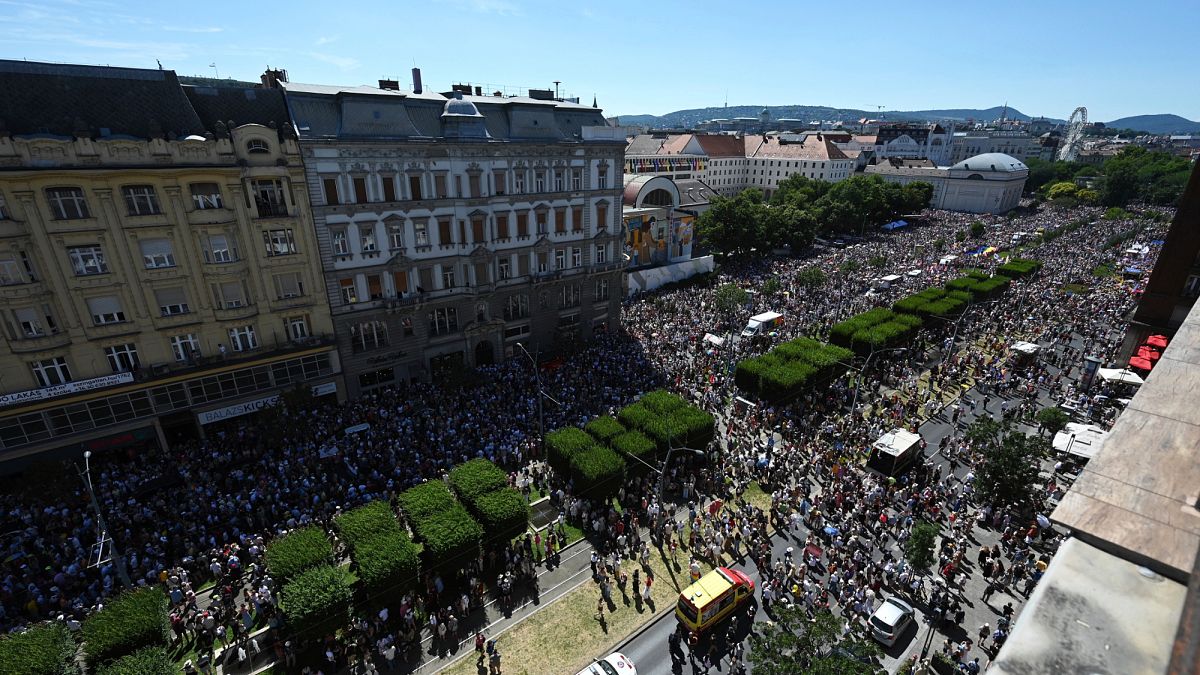

Amid a bustling summer, cities across the globe have become the backdrop for various protests, highlighting both local grievances and broader calls for change. From the vibrant streets of Budapest to the historical corners of Bangkok, these movements underscore a shared desire for rights, accountability, and respect.
In Hungary, the Budapest Pride parade drew a remarkable turnout, attracting between 100,000 and 200,000 participants. This year’s event carried added significance as it defied a government ban, embodying a peaceful protest against legislation perceived as restrictive to LGBTQ+ rights. The gathering marked a milestone, celebrating pride and solidarity, despite remarks from Prime Minister Viktor Orbán labeling the event “disgusting and shameful.” Many participants saw the parade as an important stand against policies they view as discriminatory.
Meanwhile, in Valencia, the echoes of last year’s devastating floods resonate strongly. Citizens gathered to express dissatisfaction with the regional government’s handling of the calamity. A year’s worth of rain inundated the area within eight short hours, leaving homes submerged and communities stranded. The call for accountability emphasizes the ongoing challenges of climate responsiveness and governance that residents feel have yet to be adequately addressed.
In Serbia, tensions over infrastructural negligence have sparked continuing protests. Thousands have initiated street blockades following the arrest of fellow protesters who stood against perceived corruption after a tragic accident in Novi Sad. The collapse of a rail station canopy, which claimed sixteen lives, is at the heart of these demonstrations. The public’s call for justice serves as a reminder of the crucial intersection between public safety and governmental oversight.
The fervor for change has also reached the heart of Africa, specifically Lesotho, where activist Tšolo Thakeli’s arrest has shone a spotlight on unemployment concerns. Thakeli’s longstanding campaign for youth job creation unexpectedly led to his detainment after posting a video questioning the prime minister’s efforts. On Father’s Day, Thakeli’s arrest brought to light the volatile intersection of activism and governance in the region, resonating with those demanding job creation and economic reform.
Similarly, two East African human rights advocates, Boniface Mwangi and Agather Atuhaire, have pledged legal action against the government of Tanzania. Their vivid testimony of detainment and alleged assaults electrified regional conversations about human rights and state repression. Ahead of Tanzania’s October elections, their allegations highlight the urgency of safeguarding democratic processes and individual freedoms.
In southeast Asia, Bangkok’s streets have reverberated with demands for Prime Minister Paetongtarn Shinawatra’s resignation, propelled by discontent over a leaked phone call and consequent diplomatic tensions with Cambodia. The political climate underscores the sensitivity of nationalistic sentiments and the high stakes involved in international diplomacy, as relationships with neighbors can greatly impact domestic stability.
As these protests unfold across diverse global landscapes, they serve as powerful reminders of the interconnectedness of local experiences and global themes. Each movement echoes a call for accountability, respect, and action, uniting individuals in a shared vision of a more just and equitable world. The future remains bright with potential as people persist in their quest for meaningful change, continuing the age-old tradition of making their voices heard.
Source: {link}
